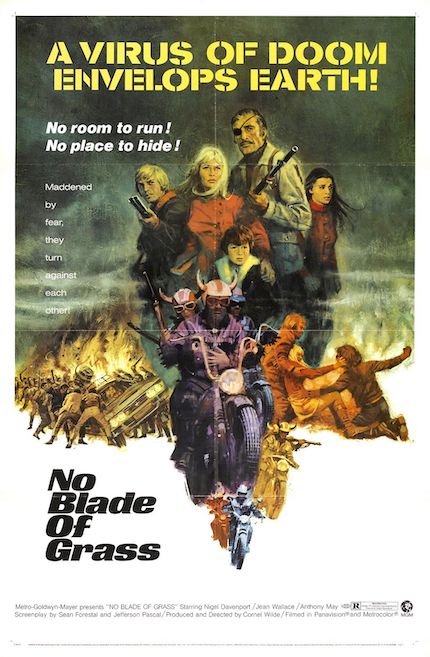Now Streaming: NO BLADE OF GRASS, Anarchy in the U.K.
Cornel Wilde's post-apocalyptic vision of John Christopher's novel is heavy-handed, hyper-hysterical, and highly entertaining. Now streaming on Criterion Channel.

"None of this would have happened if we'd gone to Canada."
No Blade of Grass
Now streaming on Criterion Channel through March 31.
After directing four films in which he starred along with Jean Wallace, his wife, Cornel Wilde starred in and directed The Naked Prey (1965), a barrelling adventure-thriller. Remaining in this vein, he starred in and directed the military drama Beach Red (1967), and then turned his hand to an adaptation of John Christopher's novel The Death of Grass.
First published in the U.K. in 1956, Christopher's novel follows John Custace and his family as they flee London in the face of an ongoing environmental catastrophe. MGM acquired the rights to the novel; Sean Forestal and Jefferson Pascal (Wilde's pen name) are credited for the screenplay, which closely follows the events in the book.
In my own mind, I'd always confused this film with Panic in Year Zero (1962), directed by and starring Ray Milland, in which a family must struggle to survive after a hydrogen bomb explosion. In fact, the two films are quite different in their tone and approach.
John Custace (Nigel Davenport) has been aware of the worsening situation in the world for a year or so, and his family -- wife Ann (Jean Wallace), daughter Mary (Lynne Frederick), and younger son David (Patrick Holt) -- is prepared to depart their home and flee to a potato farm owned by John's brother in the North of England, where they can, presumably, find refuge and safety.
Having been made aware of the dire situation they face by his friend Roger Buckley (John Hamill), a government civil servant, John has offered Roger a place on the farm as well, though it doesn't seem that he's fully aware that Roger is involved in a romantic relationship with 16-year-old virgin Mary (?!). They are soon joined by gun shop employee Pirrie (Anthony May), a rough sort who kills the gun shop's owner without hesitation and insists on accompanying the family, along with his wife Clara (Wendy Richard).
As the makeshift group make their escape from London, they are met with constant and increasing peril as the social order quickly breaks down and it becomes the survival of the fittest or, to put a fine point to it, survival of the best-armed.
Directing his first picture in which he did not star, Wilde plays around with the editing to include discomfiting moments from later in the movie that illustrate exactly how foreboding spoken words will come horribly true. It dates the movie to the late 60s, when movies like Dennis Hopper's Easy Rider (1969) were similarly playing around with unusual editing schemes.
The most discomfiting of these moments arrives in a scene of sexual assault visited upon Ann and Mary. The rape sequence is rough, violent, and unpleasant, a repulsive scene that is amplified upon realizing that Ann is played by the director's wife and that 16-year-old Mary is played by 15-year-old Lynne Frederick, in her film debut. (She turned 16 two months after filming began.) In any event, it's upsetting and disturbing. Watching the ill-fated Frederick, who died far too young in 1994, is especially heart-wrenching.
In the film's view, people must defend themselves at all costs, even if it means killing the other person. Any sort of objection, on moral or religious or spiritual grounds, is not even mentioned. 'We don't have time for that anymore' appears to be the overriding reasoning here.
Gaining momentum as the narrative flows, energized by the perpetual need to keep moving, the initial nuclear family unit is steadily enlarged by survivors chosen by John to help the entire group survive. It becomes a ruthless existence, as nearly everyone they encounter is even more desperate and violent than they are, until the small family unit finds themselves becoming ever more desperate and violent.
The tone veers from heavy-handed messaging to hysterical melodrama. Some sequences make little sense and appear to be motivated simply by a desire to be sensational, like the rape scene, or to add an excess of murderous mayhem, as with an attack by a motorcyle gang that is kinetic and thrilling, yet without any sort of motive, except to declare that in a state of anarchy, anything can happen for any reason, as long as it keeps the action rolling.
The film will stream on the Criterion Channel through Sunday, March 31.







